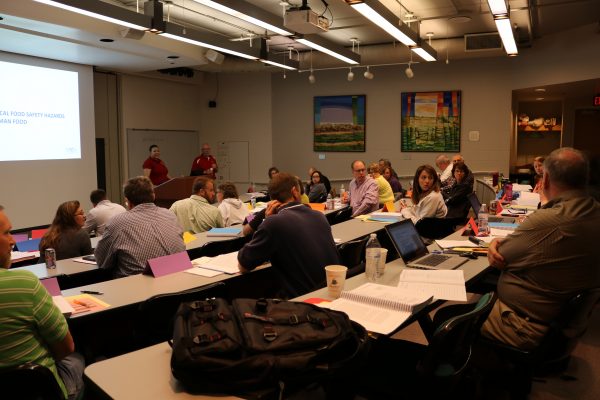
Think of it as an impending explosion in the dark: It’s coming at some point. It may be a time bomb or a firecracker. You don’t know how big, or how close to you, the eventual bang will be.
You probably ought to find out.
Experts say that’s roughly the current situation in Iowa’s food companies, many of whom can expect within months to feel the first full weight of important new federal safety regulations. A 2011 law called the U.S. Food Safety Modernization Act (FSMA) gave the FDA new powers to prevent outbreaks of foodborne disease. But the impact of new rules was largely delayed as authorities constructed complex standards and procedures.
They’re finalized now, and they’re beginning to kick in. Exactly how they affect a particular company depends on the size and type of business involved. (Or, whether you’re being pushed to adapt early by a customer’s requirements.)
“We have a whole variety of companies in the Midwest,” said Angela Shaw, an assistant professor of Food Science and Human Nutrition at Iowa State University. “We have some very small companies that are already in FSMA compliance – like this is no big deal. Then, we have some very large companies who have to come into compliance this September who don’t have any procedures in place, don’t have an employee training plan, don’t have any training at all…
“It just depends on the industry. It goes all over the board.”
The first step, according to CIRAS account manager Brenda Martin, is to get educated. Iowa State University in April held its first round of classes on the law’s Preventative Controls requirements as they relate to food for humans. Another round is scheduled for June 13-16, and a similar course for animal feed producers has been scheduled for June 27-29.
CIRAS is advising companies to quickly find out where they stand, Martin said. Companies need to understand their timeline, understand what it takes to implement all the preventative requirements, seek education and ask for help.

“The bigger Iowa companies with the September deadlines already are fast preparing,” Martin said. “The medium-sized companies, who have until next year, they’re busy preparing, too. They’re asking for help, and they’re getting themselves into preventative controls classes.”
Iowa State University earlier this year was awarded a $950,000 FDA grant to create the North Central Regional Center for Food Safety Training. A group led by Shaw now will spend three years educating food processors and growers in 12 Midwestern states.
“The first mission is to find out where everybody is at,” she said. “We need to identify who are the unaware people and how much help do they need with their processes and controls.”
Most of those who attended the Preventative Controls class in April appeared to have the situation more or less in hand.
Jon Murray, director of product operations for PurFoods, an Ankeny company that makes ready-to-eat meals, said his firm already follows procedures required by the law to prevent contamination. But some documentation steps may need to change.
“Most of the stuff we’re already doing, Murray said. “We just need to tweak a few things.”
Lori Flugum, director of quality compliance at Diamond V Mills, an animal feed supplement company in Cedar Rapids, said her firm faces a farther-out compliance deadline but likewise appears to be in relatively good shape . She attended the class, she said, because “it’s always better to know what you’re getting into than to go into things blindly.”
Registration for both the human food and animal food classes remains open.
For more information, contact Brenda Martin at bkmartin@iastate.edu or 515-570-5282.